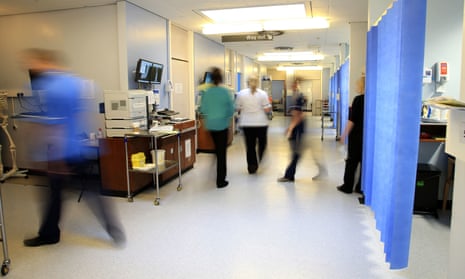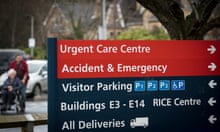The number of people waiting for hospital treatment in England has exceeded 5 million for the first time, highlighting the growing problem of long waits for NHS care.
NHS England’s latest set of monthly performance figures, published on Thursday, show that the waiting list stood at 5,122,017 in April – up 171,720 in a month.
That is the highest figure since records began in 2007, prompting fresh concerns that patients are suffering as a result of delays.
The total is a significant rise on the 4.95 million who were on the waiting list in March, which in turn saw an increase of 252,000 (5.4%) on the 4.7 million recorded in February.
The number of people being forced to wait at least a year for planned, non-urgent treatment in hospital, especially surgery, has fallen for the first time in more than a year but remains a serious problem.
Thursday’s figures show that 385,490 people have now been waiting more than 52 weeks, 50,637 down on the 436,127 in that position last month.
Such long waits are a new phenomenon. In contrast, in March 2020 – before Covid-19 triggered a suspension of much NHS care – just 3,097 patients had faced such an unusually long delay.
A new subset of the figures that was published for the first time on Thursday showed that 2,722 people have been waiting more than two years for treatment.
Under the NHS constitution, 92% of patients should be treated within 18 weeks as part of the referral-to-treatment scheme. However, that target has not been met since 2016. The Covid pandemic, combined with widespread staff shortages and a decade of austerity funding, has left many hospitals with a growing backlog.
“Waits of this magnitude are not acceptable to anyone and we know that the NHS and government are working hard to find a solution,” said Tim Gardner, a senior policy fellow at the Health Foundation thinktank.
However, he said that it would be “extremely difficult” for the NHS to increase the amount of elective care it provides given workforce shortages, burnout among staff, and the reduced number of hospital beds as a result of social distancing.
Thursday’s grim statistics underline the huge disruption to normal NHS services that the pandemic has wrought since last spring, and the huge scale of the care backlog that hospitals are facing.
Chris Hopson, the chief executive of hospitals group NHS Providers, pointed out that hospitals are now doing 90% of their pre-pandemic levels of planned surgery, ahead of NHS England’s target of 75%.
“Trust leaders are deeply aware of how frustrating long waits for care are, and are doing all they can to prioritise those who need to be seen urgently,” he said. Hospital bosses are also worried that some patients arriving at A&E are more complicatedly unwell as a result of the pandemic’s disruption of NHS services, he added.
Ministers, NHS chiefs, medical groups and health charities are worried that growing numbers of patients are facing lengthening waits for vital care, including cancer treatment, a hip or knee replacement, heart operations and surgery to remove cataracts to improve eyesight.
Jonathan Ashworth, the shadow health and social care secretary, said the figures underlined his party’s call for an NHS rescue plan to tackle the backlog.
“The reality is years of Tory underfunding and cuts across healthcare left our NHS weakened and exposed entering the pandemic, with patients now left waiting even longer in pain and anxiety for treatment.”
Danny Mortimer, deputy chief executive of the NHS Confederation, warned that hospitals may once again have to shut down normal care if the rising number of Covid infections puts serious pressure on them, and he urged the prime minister, Boris Johnson, to think carefully about lifting restrictions as planned on 21 June.
“The prime minister now faces a very big decision. A third wave, no matter the size, will have an impact on the services the NHS can provide, especially as 5.1 million people are waiting to start treatment. If the data gives rise to any doubt, health leaders would urge him to take decisive action and delay the final lifting of lockdown restrictions,” said Mortimer.
NHS England highlighted the fall in the number of people waiting more than a year, hospitals’ success in already delivering more elective care than expected, and mental health services returning to pre-pandemic levels of activity.
Prof Stephen Powis, the organisation’s national medical director, said: “Despite the extensive disruption to care caused by the pandemic, it’s encouraging that today’s figures show routine operations, cancer and mental health care have now all rebounded sharply.”
“Average waits for non-urgent care have fallen to 11 weeks, and the number of people waiting over 52 weeks fell by more than 50,000 in April. Mental health services are back at pre-pandemic levels, and treatment rates for cancer are also now back to usual levels, with nearly 19 out of 20 people starting treatment for the disease within one month.”










